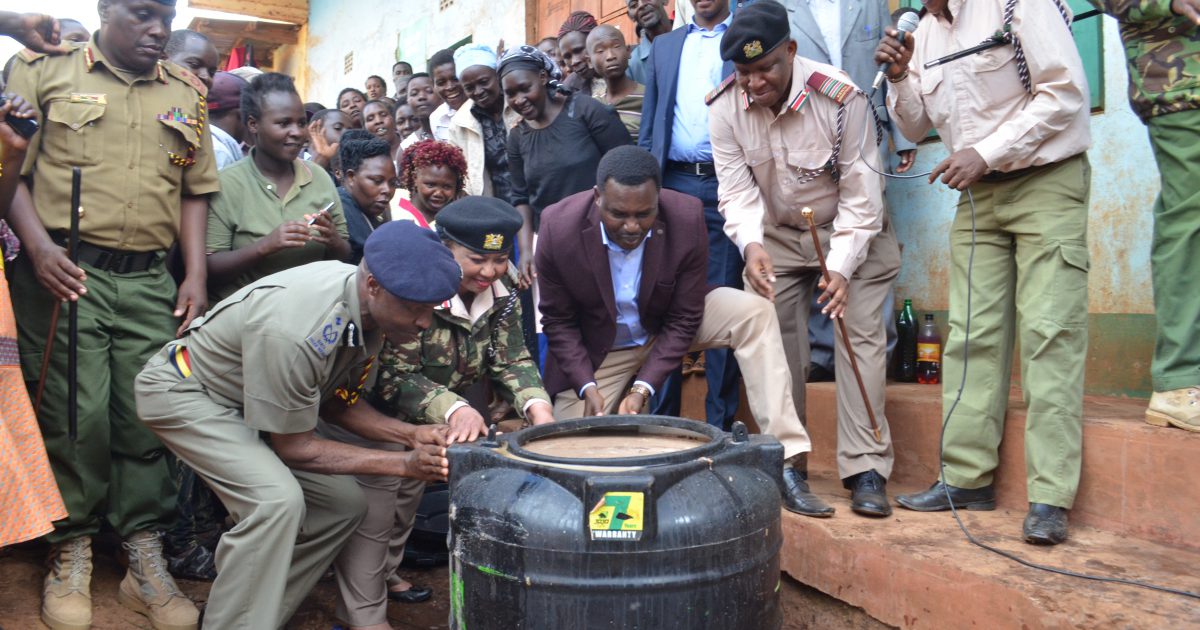Nakuru,
Saturday, April 6, 2024
KNA by Anne Mwale /Dennis Rasto
A former legislator wants the Executive and Parliament to jointly work out comprehensive measures targeted at curbing the consumption of illicit brews in Kenya.
Mr Onesmus Ngunjiri, the immediate former Bahati Member of Parliament has expressed the need to have strict laws and deterrent fines that will ensure the complete eradication of illicit brew consumption in the country.
He said that Kenyans have started celebrating the fruits of the ongoing crackdown on killer brews but hastened to add that the illicit trade was directly linked to a surge in criminal activities in some parts of Nakuru County.
Mr Ngunjiri cited Bahati Sub-County where he claimed five people had been viciously attacked by suspected organised criminal gangs associated with the underworld trade.
Addressing members of Nakuru Bar Owners Association (NBOA), the former law maker urged the law enforcement agencies and licensing teams established by various county Governments to ensure stringent compliance with laws regulating sale and distribution of alcoholic beverages.
He called upon the Judiciary to issue deterrent bail terms and fines to offenders contravening the provisions of these laws to completely eradicate and discourage illicit brew consumption.
Further, Mr Ngunjiri urged members of the public to exercise vigilance and caution while purchasing and consuming alcoholic drinks as well as desisting from excessive consumption of alcohol.
He said the illicit brews had become a major threat to the genuine alcoholic beverages in the market from established breweries due to their cheap prices.
The former MP termed the crackdown as a God-sent saying it had come to save lives and salvage the genuine alcoholic beverages industry in the country.
Mr Ngunjiri called for the weeding out of rogue law enforcement agencies from the police, national government offices, Nacada, and others.
The government has continued to enhance the crackdown with a view to nab the illicit liquor brewers, sellers and government officials abetting the vice.
NBOA Chairman Abdul Noor affirmed that bar owners in the devolved unit have thrown their weight behind the government’s efforts to eradicate the sale of illicit liquor, saying besides claiming the lives of Kenyans the vice was subjecting genuine businessmen to losses running into billions of shillings.
While advising bar owners to buy supplies from accredited distributors to avoid briefcase merchants who sell counterfeits, Dr Noor said the manufacture and distribution of killer brews can be traced to a few selfish individuals who want to enrich themselves as they endanger the lives and health of Kenyans.
He regretted that the illegal substances were causing havoc in the community and even leading to the death of mostly young consumers.
“We are right behind the government in the war against the manufacture and sale of these drinks which have caused a lot of pain among families. Apart from being pub owners, we are also parents and hence concerned by the unhealthy alcoholic substances being sold,” Dr Noor stated.
He accused unscrupulous cartels of working with the full knowledge of some unscrupulous state agents tasked with ensuring drinks are safe for fueling the trade in lethal alcoholic beverages.
“For lives to be lost and alcohol addiction to grow day by day, it means somebody somewhere is not doing their work since we have policies in place and institutions are well staffed. Somebody must take responsibility,” the Chairman demanded.
He called on the Kenya Revenue Authority and law enforcement agents to probe the source of toxic ingredients used to manufacture lethal brews and claimed that he had information that some of the substances were being sneaked into the country from a neighbouring state.
“Looking at the pattern of illicit alcohol trading and looking at how widely it is spread, there is absolutely no doubt there is a heavy cartel in operation. To move such volumes of illicit alcoholic drinks requires a lot of planning, coordination, concealment, and so on. There is a cartel and a huge one. We need to reform our institutions massively and a coordinated approach by all relevant agencies to defeat these cartels,” said Dr Noor.
Dr Noor expressed their objection to plans to reduce the number of pubs in towns but instead called for the closure of illegal or unlicensed alcohol-selling outlets.
The chairman indicated that the second-generation alcohol brewers and sellers were running genuine traders out of business and denying the government revenue as they don’t pay taxes.
He said the liquor sector in Nakuru was employing at least 1,000 workers directly and supporting thousands more including those in the food industry and transportation and therefore the need to protect them from unfair competition.
“As genuine traders in the sector, we feel shortchanged by those trading in illicit and harmful substances who also deny the government revenue. We support efforts to eliminate these brews,” said the official.
He encouraged people to contact the Anti-Counterfeits Authority (ACA) Kenya Revenue Authority (KRA) and Kenya Bureau of Standards (KBS) for appropriate action if they suspected an alcohol outlet was selling counterfeit products.
He also called on liquor manufacturers to monitor their products in the market in a move aimed at exposing killer brews.
Dr Noor said their association of over 1,500 members will continue complying with the government’s directive to sell approved alcoholic brands.
The chairman said clients should be mindful of what they consume as many products can be concealed as fit but are substandard thus becoming a threat to their health.
Dr Noor said that their association has been conducting aggressive campaigns across the country, sensitising the public on the dangers of consuming illicit brews.
“Because the illicit stuff is cheap compared to the legal products we sell, they attract many consumers, thus giving us unfair competition,” Dr Noor said.
He alleged that illegal traders import and successfully clear methanol disguised as ethanol by carefully deleting the letter ‘M’ from the container so that the products appear to be ethanol.
Courtesy; KNA


